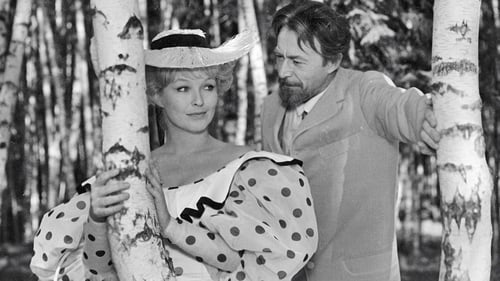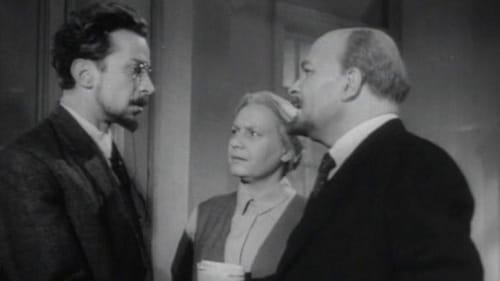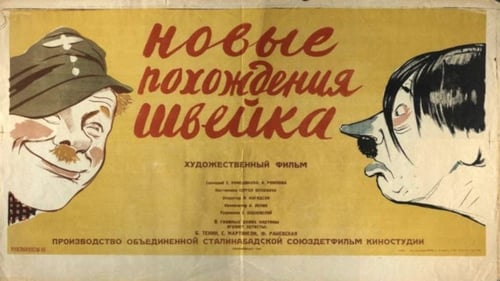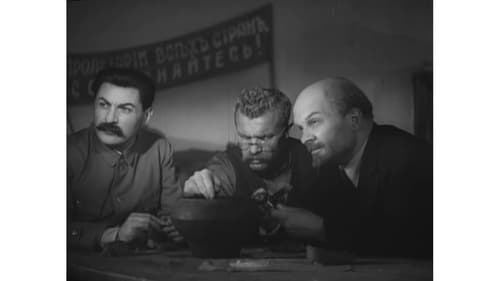Sergei Yutkevich
Nacimiento : 1904-08-15, St. Petersburg, Russian Empire [now Russia]
Muerte : 1985-04-24
Historia
From Wikipedia, the free encyclopedia
Sergei Iosifovich Yutkevich was a Soviet film director and screenwriter.
Sergei Yutkevich began work as a teen doing puppet shows. Between 1921 and 1923 he studied under Vsevolod Meyerhold. He later helped found the Factory of the Eccentric Actor (FEKS), which was primarily concerned with circus and music hall acts. He entered films in the 1920s and began directing in 1928. His films often were cheerier than most Russian films as he was influenced by American slapstick, among other things. However he also did serious historical films, docudramas, and biopics.
He won Cannes's Best Director Award twice: for Othello in 1956 and for Lenin in Poland in 1966. Of his later films Lenin in Paris is among the best known.

Director

Writer
This little-seen and little-discussed film combines animation with self-reflexive, live action segments to embody the anarchic, satiric spirit of the poet and playwright Vladimir Mayakovsky (1893-1930). The film also showcases Sergei Yuktevich's fondness for formal experimentation. It is nominally adapted from Mayakovsky's play "The Bedbug" and his screenplay "Forget All About the Fireplace."

Director
This little-seen and little-discussed film combines animation with self-reflexive, live action segments to embody the anarchic, satiric spirit of the poet and playwright Vladimir Mayakovsky (1893-1930). The film also showcases Sergei Yuktevich's fondness for formal experimentation. It is nominally adapted from Mayakovsky's play "The Bedbug" and his screenplay "Forget All About the Fireplace."

Art Direction
Based on the novel of the same name by Chinghiz Aitmatov. The action takes place during the days of World War II in one of the villages of Kyrgyzstan. The famous artist Seit recalls his childhood, his first unrequited love for Dzhamilya, the wife of his older brother, and the wounded front-line soldier Daniyar, whose songs taught to notice beauty... A poetic story about love, the secrets of creation, the national customs of the Kyrgyz people.

Director
The film tells about Anton Pavlovich Chekhov. October 17, 1896. On the facade of the Alexandrinsky Theater — a poster about the premiere of "The Seagull". A few hours are left before the performance. Chekhov and his sister Masha are expecting Lika Mizinova from Moscow station to arrive from Moscow. Chekhov is alarmed by the upcoming premiere, excited by the meeting with love, which never took place. Memories of acquaintance with Lika, of the experiences caused by the rude scolding of newspaper men who predicted the young writer the inglorious "death under the fence", about the unexpected decision for everyone to go to Sakhalin...

Supervising Editor
Bezhin Lug (Bezhin Meadow) was to be a Soviet film about a young farm boy whose father attempts to betray the government for political reasons by sabotaging the year's harvest, and the son's efforts to stop his own father to protect the Soviet state, culminating in the boy's murder and a social uprising. Assigned to Soviet film-maker Sergei Eisenstein, the filming followed the same path as with his previous effort, "Que Viva Mexico", into cost overrun and over-shooting of footage. Furthermore, Eisenstein's usage of forbidden experimental film techniques outraged his government superiors, who ordered the film destroyed before it was even completed. All that survives are the first and last frames of each shot, preserved by Sergei Eisenstein’s wife, Pera Atasheva. The 1967 reconstruction, by Naum Kleiman of the Eisenstein Museum and Sergei Yutkevich of Gosfilmofond, places these frames in order, approximating the original film.

Archival Footage Coordinator
Bezhin Lug (Bezhin Meadow) was to be a Soviet film about a young farm boy whose father attempts to betray the government for political reasons by sabotaging the year's harvest, and the son's efforts to stop his own father to protect the Soviet state, culminating in the boy's murder and a social uprising. Assigned to Soviet film-maker Sergei Eisenstein, the filming followed the same path as with his previous effort, "Que Viva Mexico", into cost overrun and over-shooting of footage. Furthermore, Eisenstein's usage of forbidden experimental film techniques outraged his government superiors, who ordered the film destroyed before it was even completed. All that survives are the first and last frames of each shot, preserved by Sergei Eisenstein’s wife, Pera Atasheva. The 1967 reconstruction, by Naum Kleiman of the Eisenstein Museum and Sergei Yutkevich of Gosfilmofond, places these frames in order, approximating the original film.

Writer
The life of the great Bolshevik leader before the Russian revolution is chronicled in this bio-pic. Much of the tale centers on his exile in Poland where Lenin becomes friends with two peasants. The little girl has a strong belief in the nationalist cause. Later Lenin hears she was killed for withholding information about him.

Director
The life of the great Bolshevik leader before the Russian revolution is chronicled in this bio-pic. Much of the tale centers on his exile in Poland where Lenin becomes friends with two peasants. The little girl has a strong belief in the nationalist cause. Later Lenin hears she was killed for withholding information about him.

Screenplay
Soviet animated feature film

Director
Soviet animated feature film

Director
A few stories about Vladimir Lenin.

Director
The tour of the French singer Yves Montand and actress Simone Signoret to the USSR in 1956.

Director
Soviet film of the Shakespeare play.

Director
A biography of George Kastriot Skanderbeg widely known as Skanderbeg, a 15th-century Albanian lord who defended his land against the Ottoman Empire for more than two decades.

Director

Director

Director
Memories of the old Baltic sailor who participated in a revolution and a few wars...

Director

Director
The New Adventures of Schweik adopted to the WWII reality.

Director

Director
The story of the Bolshevik revolution through the eyes of a peasant who, as a soldier, gets caught up in the proceedings under the tutelage of Lenin.

Director

Writer
A Soviet documentary made for the 10th anniversary of the new Turkish Republic in the year 1934.

Director
A Soviet documentary made for the 10th anniversary of the new Turkish Republic in the year 1934.

Director
Shame or Counterplan is a 1932 Soviet drama film directed by Sergei Yutkevich and Fridrikh Ermler. The film’s title-song called "The Song of the Counterplan", composed by Dmitri Shostakovich, became world famous and was adapted into "Au-devant de la vie", a notable song of the French socialist movement of the 1930s. This film could be considered as a Stalin propaganda film. The plot involves an effort to catch "wreckers" at work in a Soviet factory. From Wikipedia, the free encyclopedia

Writer
Soviet "proletarian" film about anti-war strike at St Petersburg factory, 1914. Resembles Pudovkin's classic "End of St. Petersburg," made 4 years earlier: backward lad (Poslavsky) from poor village comes to town desperate for work. He's hired as replacement ("scab") worker at big metallurgical factory, which is in the throes of a strike organized by the Bolsheviks (communists). The Bolshevik strikers are led by Ivan Shtraukh (brother of the more famous Russian actor Maxim Shtraukh). At first, the deceitful industrialist's son (Fedosev) involves the naive Poslavsky in an attempt to murder Shtraukh, but the attempt only wounds the heroic organizer. Will Poslavsky follow through with the planned killing, or will he redeem himself by going over to the side of the strikers?

Director
Soviet "proletarian" film about anti-war strike at St Petersburg factory, 1914. Resembles Pudovkin's classic "End of St. Petersburg," made 4 years earlier: backward lad (Poslavsky) from poor village comes to town desperate for work. He's hired as replacement ("scab") worker at big metallurgical factory, which is in the throes of a strike organized by the Bolsheviks (communists). The Bolshevik strikers are led by Ivan Shtraukh (brother of the more famous Russian actor Maxim Shtraukh). At first, the deceitful industrialist's son (Fedosev) involves the naive Poslavsky in an attempt to murder Shtraukh, but the attempt only wounds the heroic organizer. Will Poslavsky follow through with the planned killing, or will he redeem himself by going over to the side of the strikers?

Director
The struggle of the Komsomol members against private speculators for the surrender of fish to the state.

Director
Since director Sergei Yutkevich was a longtime lover of American slapstick, his first films were imbued with a playfulness and cheeriness not typical of Russian cinema. And Kruzheva is a good example of that as he illustrates the friendly rivalries between the youths on village in both a very rough and clowning way.

Art Direction
A married couple have a small apartment in Moscow. When an old friend of the husband's arrives in the city, he is unable to find lodgings. Kolia, the husband, invites his friend to move in with them.

Director
Directed by Sergei Yutkevich.












